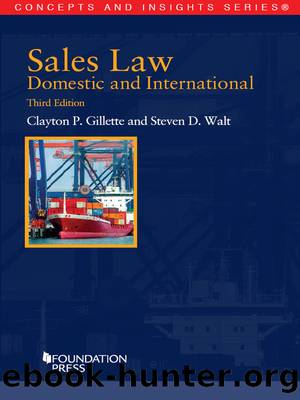Sales Law, Domestic and International by Clayton Gillette

Author:Clayton Gillette
Language: eng
Format: epub
ISBN: 9781634602181
Publisher: West Academic
Published: 2015-01-15T00:00:00+00:00
C. Under the CISG
1. âImpediment Beyond His Controlâ
The CISG reflects the UCCâs analysis of excuse to a significant degree, though the CISG employs a different language. Article 79 of the CISG âexemptsâ either the seller or the buyer from liability for failure to perform contractual obligations if the defaulting party proves (1) that the failure was due to an impediment âbeyond his control,â (2) that âhe could not reasonably be expected to have taken the impediment into account at the time of the conclusion of the contract,â and (3) that once the impediment materialized, he could not reasonably have avoided or overcome it or its consequences. Of course, the party seeking exemption must also demonstrate a causal relationship between the non-performance and the impediment. The party seeking exemption will bear the burden of proof on all these issues.153 Although the Article avoids language of âimpracticabilityâ and phrases such as âthe occurrence of a contingency the nonoccurrence of which was a basic assumption,â the principles behind those terms appear also to inform the CISG standard. Nevertheless, the term âexemptionâ is descriptively correct, since the CISG does not end the obligation, but simply âexemptsâ the affected party from liability for failure to perform its obligations.
The requirement that materialization of the impediment must be beyond the control of the party seeking exemption is somewhat ambiguous. It does not simply indicate that the party must take reasonable precautions against materialization of the impediment. That obligation is addressed through the condition that exemption is permitted only if the party could not reasonably be expected to have avoided the impediment or its consequences. The âbeyond his controlâ requirement imposes a stricter requirement that the impediment materialized from some exogenous event outside of what some commentators call the âsphere of influenceâ of the party seeking exemption. A labor strike at the sellerâs plant that prevents production of the required goods may be within the sellerâs control, while a general strike that has the same effect is not. This suggests something close to a strict liability rule in which an obligor guarantees performance with respect to matters of internal organization and perhaps choices of suppliers and employees. Similarly absolutist language can be found in the Secretariat Commentary to the CISG, which includes that statement that the draft counterpart to Article 79 âreflects the policy that a party who 288
is under an obligation to act must do all in his power to carry out his obligation and may not await events, which might later justify his non-performance.â154
As an interpretation of Article 79, the rule described by these statements is too strict. At some cost, an obligor will almost always be able to avoid loss. Fire can be prevented by hiring round-the-clock guards armed with fire extinguishers; shipping disasters can be avoided by shipping the goods twice, in case something goes awry with the first shipment. But these possibilities make the possibility of an exemption superfluous. Indeed, notwithstanding that doing so seems to replicate the âreasonably avoidableâ requirement elsewhere in
Download
This site does not store any files on its server. We only index and link to content provided by other sites. Please contact the content providers to delete copyright contents if any and email us, we'll remove relevant links or contents immediately.
The Social Psychology of Inequality by Unknown(2311)
The Plant Paradox by Dr. Steven R. Gundry M.D(2040)
The Writing on the Wall by Anselm Jappe(1759)
Working for Yourself by J.D. (Nolo) Stephen Fishman(1478)
Every Landlord's Legal Guide by Janet Portman & Stewart Marcia & Ralph Warner(1325)
The First 20 Hours: How to Learn Anything ... Fast by Kaufman Josh(1304)
ADHD on Trial by Michael Gordon(1241)
Decisive by Chip Heath(1201)
Drafting Contracts: How and Why Lawyers Do What They Do, Second Edition by Stark Tina L(1171)
Working for Yourself by Stephen Fishman J.D. (Nolo)(1139)
The Economist Aug 8th 2015 by The Economist(1123)
Restitution by Restitution(1115)
The Economist Aug 29th 2015 by The Economist(1097)
A Practical Guide to International Arbitration in London by Hilary Heilbron(1084)
Intellectual Property Strategy by John Palfrey(1082)
The Lord of the Rings: The Fellowship of the Ring, the Two Towers, the Return of the King by J. R. R. Tolkien(1082)
Collusion by Luke Harding(1045)
Persuasion by Owner(1012)
Chapter 1 by Owner(950)
